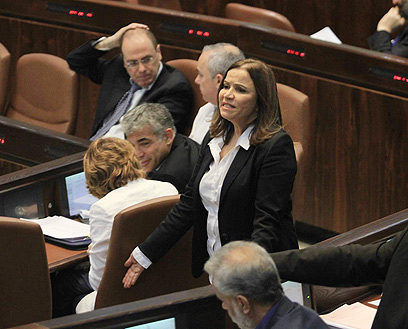
Knesset approves Governance Bill in preliminary reading
Coalition, opposition spar in uniquely bitter, diatribe-filled session; Gal-On: 'A dictatorial move by an evil government intent on silencing the opposition'
The bill, introducing significant amendments to the Basic Law that defines the structure of government in Israel was brought before the legislative assembly by Yisrael Beitenu Knesset Member David Rotem, reportedly at the behest of Prime Minister Benjamin Netanyahu and the former FM and Yisrael Beitenu chief Avigdor Lieberman.
Related stories:
- Ministers OK governance bill draft
- New bill aimed to beef up power of gov't
- Dagan calls for change in governance system
It is aimed at significantly complicating the passing of no-confidence motions in the Knesset plenum, limiting the number of cabinet ministers to 19 and raising the electoral threshold to 4% of the general vote.
Rotem attempted to explain the law, the full title of which is "Increase of Governance and Raising of the Electoral Threshold," before the plenum at the start of the session, but incessant catcalls made this difficult.
Numerous opposition MKs called out criticisms of the motion, alleging it represented a tyranny of the majority over the minority. Labor chair Shelly Yachimovich said the bill was "rude, brutal, dictatorial and hypocritical. Are not you ashamed? Don't you have any self respect? Does public visibility not deter you?"

Opposition head Yachimovich lashes out at proposed bill (Photo: Gil Yohanan)
Yachimovich leveled a bitter diatribe at former opposition colleague and current Justice Minister Tzipi Livni, head of the Ministerial Legislation Committee which approved the bill Sunday.
"You should be ashamed of yourselves. All the ministers voted for the law, including Justice Minister Tzipi Livni who so recently was head of the opposition," Yachimovitch charged. "And conducting the whole shebang is no other than Avigdor Lieberman, who cannot even function as minister due to an ongoing trial."
To the bill’s sponsor, Yachimovich said, “Maybe you will decide that we should expel and dismiss from the Knesset anyone who does not agree with the government?"
Former Knesset speaker and Likud MK Reuven Rivlin was no less critical, saying "Menachem Begin is turning in his grave. This is the wiping out of democracy. The annihilation of the Knesset. You'll see, they'll add a clause whereby a minister objecting to the bill will be sacked with immediate effect. In a word, a disgrace."
Hadash MK Mohammad Barakeh, who branded Rotem a "fascist," had to be restrained and escorted out of the auditorium.
Knesset Speaker Yuli Edelstein abstained, having already voiced his objection to the bill in its current form, saying the raising of the electoral threshold risks denying ideological minorities representation in the Knesset and alienating many voters.
Justice Minister Tzipi Livni was absent from the vote, as was MK Avigdor Lieberman and Prime Minister Benjamin Netanyahu, currently on a tour of China. Finance Minister Yair Lapid and Yesh Atid party members voted in favor.
Meretz chair MK Zahava Gal-On responded to the passage of the Governance Bill and said, "This is a dictatorial move by an evil government intent on silencing the opposition."
"Instead of focusing on changing the governance system, concentrate on changing that which allows its cruel economic policies," Gal-On said addressing members of the coalition. "Yesh Atid, Hatnua and Habayit Hayehudi were responsible for Lieberman executing his dictatorial move. The problem here is not in the governance, but in the governors."
The Governance Law
The first clause in Rotem's bill purports to significantly complicate the passing of the motion of no-confidence. "The people elected the government so it could rule, and we must enable it to do just that," the MK told Ynet regarding his bill.
Rotem added the prime minister and the government should not be subject to "extortion and endless parliamentary shenanigans."
As things stand, every Knesset faction can submit a proposal toward a vote of no-confidence, a right various opposition parties choose to exercise on an almost weekly basis. This stands to be revoked in the new law, which will enter effect starting with the next Knesset.
Other clauses aimed toward increasing the power of the government state that in the event a vote of no-confidence passes, and the appointed opposition leader fails to assemble a government, the previous government returns to its duties.
Also under the new bill, the president's stamp of approval shall no longer be a precondition for the dismissal of the Knesset.
In addition, the law proposal seeks to limit the number of cabinet ministers to 19 and double the electoral threshold to 4% of the general vote. This controversial motion is seen as targeting the smaller parties - chiefly the Arab ones - which make up a significant proportion of the opposition.
Another clause potentially hurtful to the smaller political blocs is calling off the funding for the election campaigns of those parties which failed to pass the electoral threshold. The practical meaning of this is likely to be the obliteration of many fringe parties unable to secure independent funding of their campaigns.
Finally, the law proposes the reduction of the number of cabinet ministers to 19, including the prime minister, stipulating that the number of deputy ministers will not exceed four..
The law's architects state its aim as bolstering the stability of the government. "The current situation, when no-confidence motions became a routine matter, though the opposition usually cannot designate a leader, is undesirable," read the proposal. "The purpose of (the bill) is to enable more effective governing and reduce incentives for excessive fragmentation and divisiveness in the political system."
- Receive Ynetnews updates directly to your desktop










